The strangest meal I’ve had in my long life was a five-hour lunch with the world famous former Australian cricket captain Ian Chappell – just the two of us – and, the funny thing is, we never spoke once.
Not one word. Though we did, finally, communicate in a male sort of way.
It happened like this.
In November 1986 The Australian newspaper sent me to Perth to cover the second Ashes cricket Test against England: not to write the scoreboard like a sports reporter, but as the colour writer to describe the scene.
Because my boss Rupert Murdoch half-owned Ansett Airlines, I travelled First Class and when I took my seat at the front of the plane the person in the window seat on my left was the batsman every Australian would have chosen if they had to pick someone to bat for their life. Chappelli.
Immediately I could see that this Ian Chappell – now a TV broadcaster – was used to being monstered by cricket fans wherever he went, so he already had a set of airline earphones on and looked doggedly to the front as if he was batting.
Instead of asking him to fasten his safety belt, a beautiful hostess came up the aisle on my right and leaned over me as we taxied to the runway in Sydney and said: “Mr Chappell, we are so pleased to have you on board. My name’s Mary. May I have your autograph?”
Chappelli graciously signed the piece of paper without speaking, or even moving his moustache, and Mary said, “My nephew will be thrilled, Mr Chappell, thanks very much.”
I was rather put out because no beautiful hostesses ever came up and gave me their name. And I was sure the autograph was for her, not her nephew.
Soon after take-off, one of the pilots came out and stood patiently in our aisle next to me while Ian was writing in an exercise pad studiously avoiding the gaze of passengers supposedly heading for the toilet. Not being a good flyer, I was thinking What’s going on here? Get back inside the cockpit in case something happens to the other pilot!!!
Now the pilot was leaning over me, in my airspace, his left arm on the back of my chair to get closer to Chappelli … taking the fresh air from my personal vent overhead.
“Ian, Ian… Mr Chappell,” he said, “we’ve been having an argument up front. How many centuries did you score in Test matches?”
How well is our plane being flown if the two pilots are arguing over such a minor statistic? Who the hell’s watching the all-important altimeter, let alone the gyroscope. Don’t they realise I can’t see land from where I’m sitting!
Reluctantly, Ian Chappell looked up from his school pad and said just one word: “Fourteen.” And looked down again. As a first drop batsman Chappelli had to be dug out, and he wasn’t co-operating here either.
The pilot was oblivious to the vibe coming from both of us.
Producing a piece of paper and a pen he said: “Now Ian, ‘this is your captain speaking’ … Could you write that figure down and sign it on here. That way there’ll be no more argy-bargy in the cockpit.”
To my great relief Chappelli scribbled on the pilot’s piece of paper and we both mentally waved him away, back towards his all-important instruments. After all, we were 30,000-feet above the bloody ground!
There were still four hours to go on our flight across the entire width of Australia when lunch arrived. I noticed Chappelli didn’t eat the ham but gobbled down the lettuce, cucumber and mushrooms. No wine, but he asked for “plenty of ice”.
Interestingly, he was carrying two tennis racquets … and my own was in the overhead locker above. I knew that with his eye and timing, he’d be a pretty good player, but I had played inter-Varsity for UQ at Sydney University. We’d both be stuck in Perth for a week … so I was dying to ask him for a hit while we were there. But Chappelli kept his headphones firmly over his ears, eyes front, even while eating.
I didn’t know how he would react to such a suggestion from a complete stranger: after all, twice during his cricket career Ian had sworn at umpires. He didn’t have a reputation as a man who would leave you wondering where you stood.
I could, of course, have told him I’d once had a hit of tennis with his brother Greg at a mutual friend’s house at Moggill. In fact, Ian probably didn’t even know that his younger brother had been conferred the nickname of “God” among males in Brisbane because of his incredible Sheffield Shield performances for his adopted state of Queensland: batting, fielding, and bowling.
I’d met Greg a few times and had noted something very interesting about his intense eye for sporting detail.
That Moggill tennis day I played a set on the grass court against Australia’s Wallaby captain Mark Loane. This unlikely match-up had come about because one dull day in The Australian’s gloomy Fortitude Valley office, Loane had shocked the Bureau when he suddenly appeared, filling the doorway as only he could.
Loane was carrying a single red rose in his right hand and his presence as he smiled on us, a smile serene and high, made everything in the office … the chairs, the old desks, the ancient typewriters, even us … seem small and insignificant.
We had a beautiful young reporter on our team, Sally Fraser, and it turned out the flower was for her. As Mark handed it gallantly over, a dozen male reporters were a bit jealous – not of the flower mind you – but that Sally knew our Queensland rugby union hero.
After Loane left, I told Sally I’d noticed him playing tennis as I walked past the Uni courts just that week.
“Yes, he’s a very good player,” she said proudly.
Still a little miffed, I said Loane didn’t look all that good to me.
Sally must have told him because a challenge was issued and I found myself on that Moggill court now facing up to Loane. I felt like Horatius keeping the bridge in ancient Rome when “the great Lord of Luna” strode forward to clear him out of the way: “Upon his ample shoulders clangs loud the fourfold shield, and in his hand he shakes the brand which none but he can wield”.
I couldn’t even work out which hand Lord Loane was carrying his brand in!
It turned out that this giant rugby forward was completely ambidextrous. When he threw the ball up to serve, he sometimes served with his right hand, other times with his left! And, whenever he wished, Loane hit forehands off both sides!
It was supposed to be a friendly social match but I soon worked out what it is that makes international sporting champions. Loane didn’t do “friendly”. When we changed ends and I handed over the three balls for his serve, I’d offer affable small talk like was that a left-handed backhand or a right-handed forehand winner Mark? But he never once answered, or even looked my way. Later, he explained “I never talk to opponents when I’m competing.”
It turned out Loane had played tennis for the Nudgee College First IV. And he was getting the better of me.
Greg Chappell was outside the tennis fence at my end of the court throwing a ball over and over to his tiny son, and not taking any notice of us. On a vital point Mark Loane hit a searing right-handed forehand (or was it a left-handed backhand?) down the line past me, and it zipped off the grass so close to the line that, although I desperately wanted to, I didn’t call it out.
Suddenly the voice of another international sports star, still throwing a ball to his baby boy while side-on to the court, said authoritatively: “The ball was out!”
And who could question the unerring eye of God himself?
I’d interviewed Greg for a Channel 7 TV Special after the underarm bowling incident where my opening question was: “Greg did you feel a bit of a bastard when you got your brother Trevor to bowl that underarm ball?” I thought Greg might get annoyed, but he wasn’t fazed at all. Another time the editor of The Australian rang in a panic: “Rupert’s coming to town. We need a full-page feature story for this weekend on a hugely successful sportsman or businessman!” So I rang Greg Chappell, who, now that he’d retired, was investing his money in, of all things, his own mango plantations.
I wondered whether Ian Chappell had invested in mangoes too, and if not, why not. But couldn’t ask. I also wanted to tell Ian a story that illustrated just how famous his little brother Greg had become in Queensland.
After competition tennis one hot Tuesday night in Brisbane, the opposition team of six invited our team University Turkeys (motto “Don’t let the Turkeys get you down”) back to their house at 11 pm for drinks. My doubles partner, journalist Adrian McGregor, was writing a biography on Greg Chappell and, as the party got going, Adrian – speaking from behind his Abraham Lincoln beard – started: “Yeah, well when I was talking to Greg Chappell last week …” causing shock and awe to our six opponents, one of whom spilt his beer all over me.
Realising my chance, I chortled: “You were talking to Greg Chappell! … You were talking to God!” And all six opponents burst out laughing with me at the sheer impossibility of this bearded middle-aged man in white shorts sitting in their lounge room ever getting to talk to the great man himself.
All Adrian could do was laugh along with us.
Not being able to engage Ian Chappell in conversation on this flight to Perth, I started taking notes about him surreptitiously on a folded over newspaper.
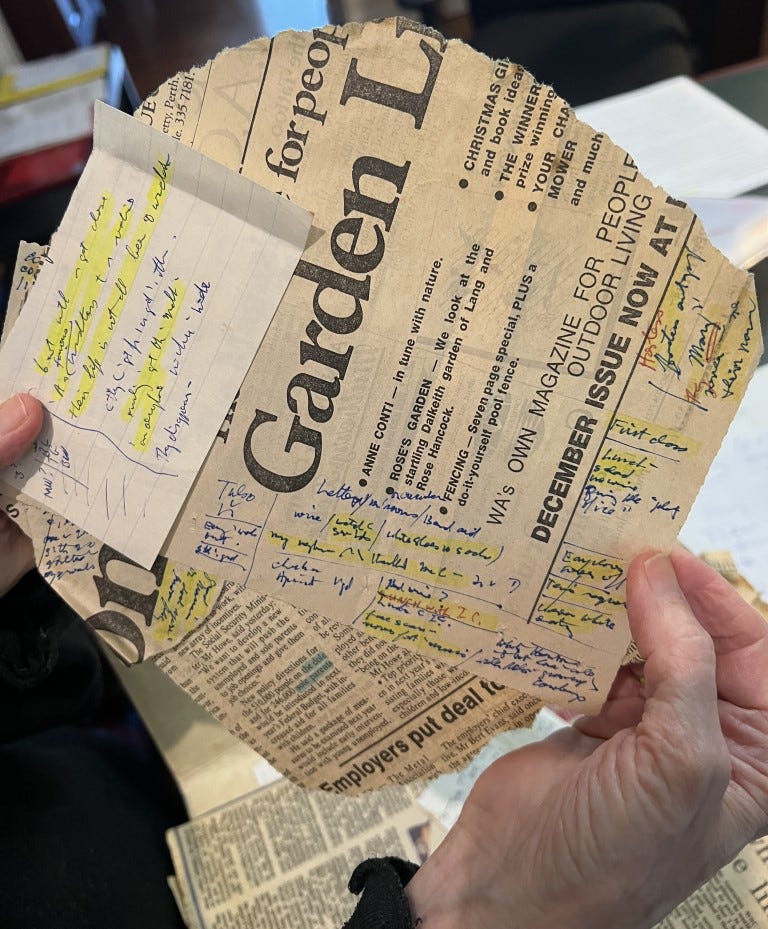
His batsman’s thighs were a bit too big for his trousers, making the trousers too short for his legs when he stretched them out (as you can in First Class) showing most of his white socks and white shoes. Up close, you could see small scars on his face – from cricket balls or skin cancers? Together with the thick forearms and broad back when he leaned forward in his seat, it created an aura of toughness.
I didn’t wear a watch, but I wrote down that he had a watch “with several hands”. And I noted that he moved his feet to the music he was listening to: Whitney Houston and Willie Nelson: “Mommas, don’t let your babies grow up to be cowboys…”
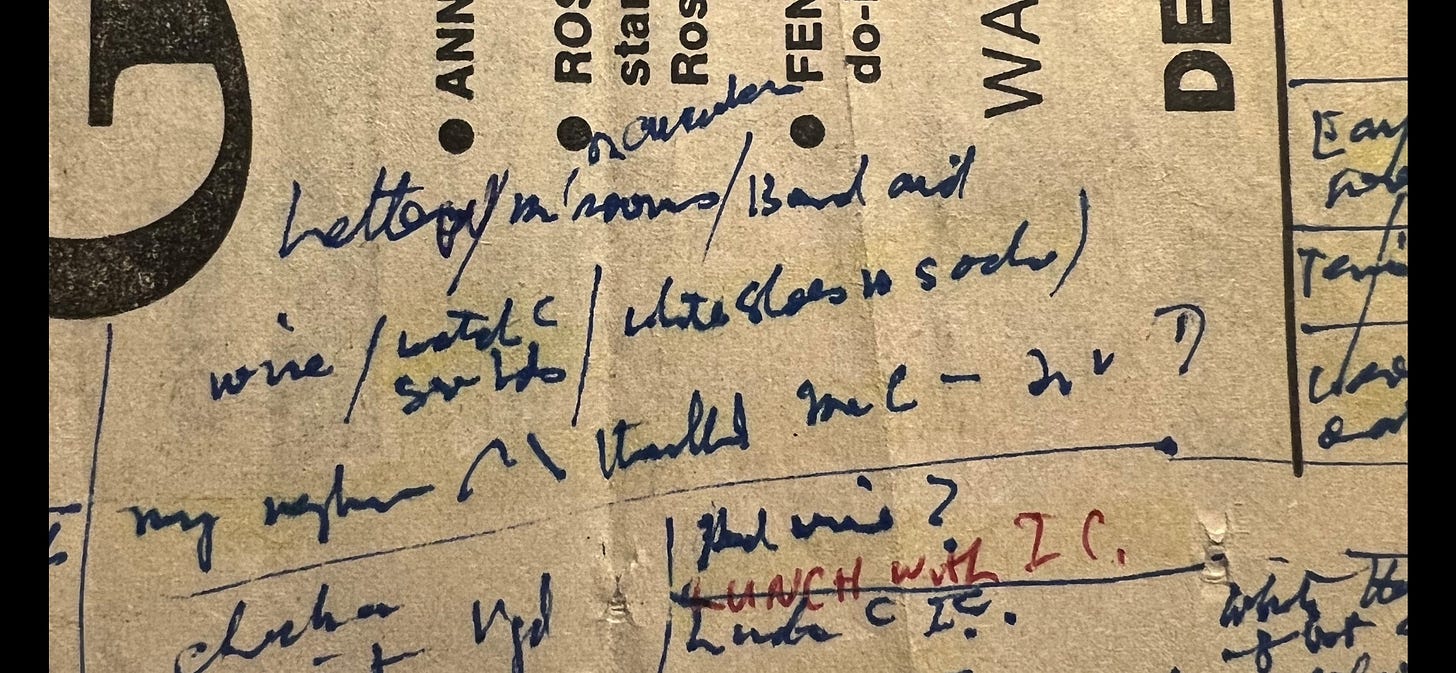
Afternoon tea in First Class over the Nullarbor Plain included chicken-in-apricot which was very, very good, and we both had a glass of Taltarni Shiraz 1980. Ian declined tea or coffee, but when Mary arrived with two little chocolates on a platter he spoke with the authority of an Australian captain: “Not two. One’s enough.”
I was hoping to get the spare chocolate, but Mary took it away.
A lot of Chappelli’s time was spent writing in his exercise book.
By leaning just a little to the left, I guessed he was composing his newspaper column because he constantly counted the number of lines he had written. Accustomed to newspapers requiring all stories to be typed double-spaced on copy paper, I watched him correcting his column in this school exercise book using a pencil and eraser, a big white Staedtler. I thought he must be the only full-grown man in Australia who still used a schoolboy rubber.
He wrote very quickly, in spurts, in an untidy hand but with great concentration: like a man who believes passionately in what he is writing, not like one who is a pencil for hire. A man not afraid to adjust his stance: just like when he batted in Test matches.
As we approached Perth it occurred to me that Ian Chappell must have by now decided that I was from Lithuania, or Estonia, or the tiny village of Langesund in Norway … because I clearly didn’t recognise the most famous face in Australia.
In the 1980s, aircraft headphones had a clumsy double pronged lead which had to be inserted (the correct way up) on the inside of the armrest.
Having given up taking notes on Chappelli, I decided to sit back and relax but couldn’t plug my headphones in. Something was clearly amiss.
So I buzzed … and Mary came running up the aisle to Chappelli row.
She seemed deflated when it was me, but when I showed her the problem, she kindly offered to insert the double prongs in the two holes for me.
However, leaning over the armrest she could not do it.
I told her not to bother, but ever-so-helpful Mary kneeled in the aisle next to me and leaned her head around my armrest to try to look into the two holes to see what the problem was.
I dared not move as her head hovered above my lap.
For the first time, Ian Chappell turned my way. His eyes grew bigger and bigger as he watched me withdrawing further and further into the seat. I turned to him and, for a moment, we looked at each other as this beautiful young woman continued moving her head above my lap in a concentrated bid to insert the wayward double-pronged headphones.
That was the moment when Ian Chappell and I – complete strangers – made a life-long connection. Even though we never spoke.


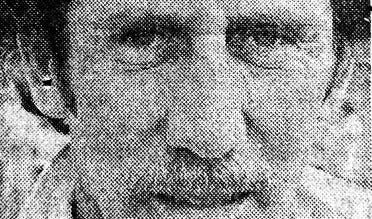



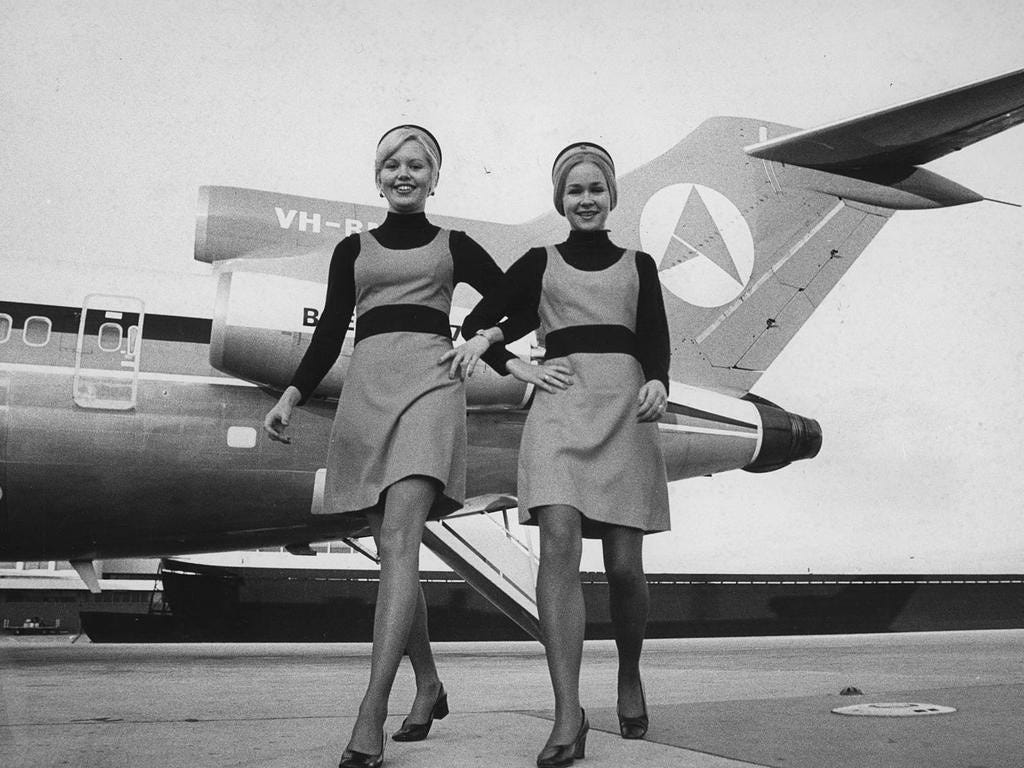
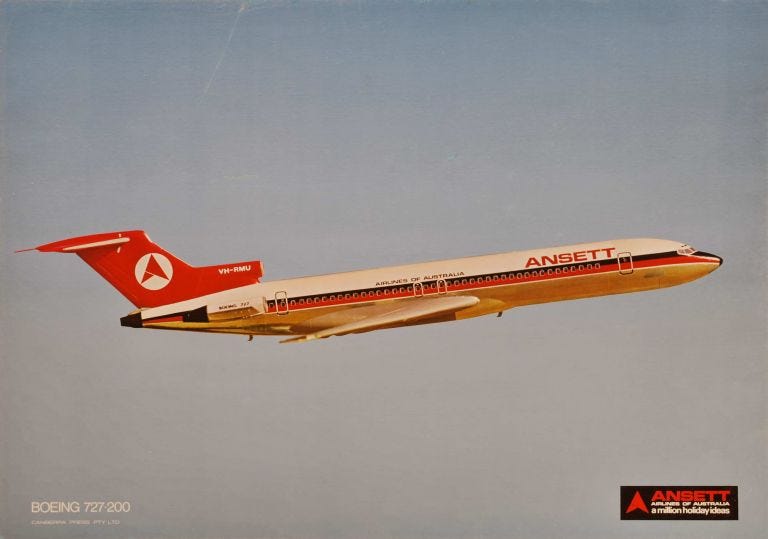
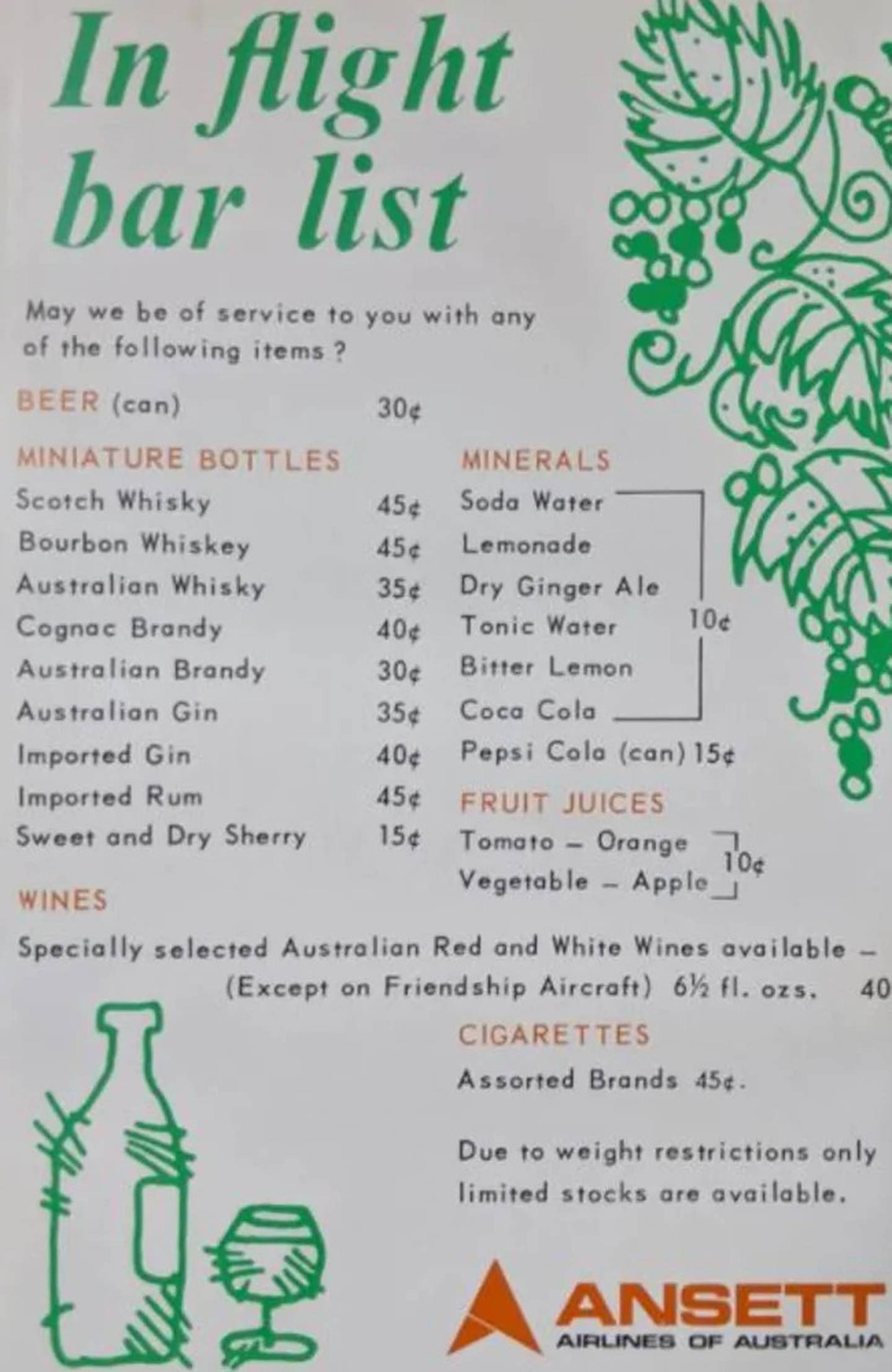
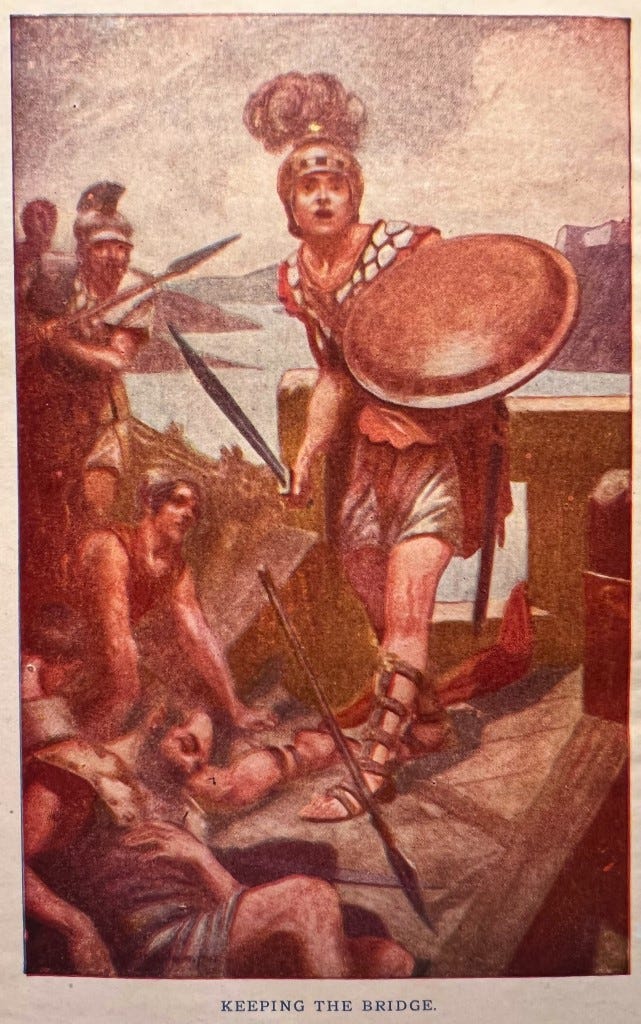
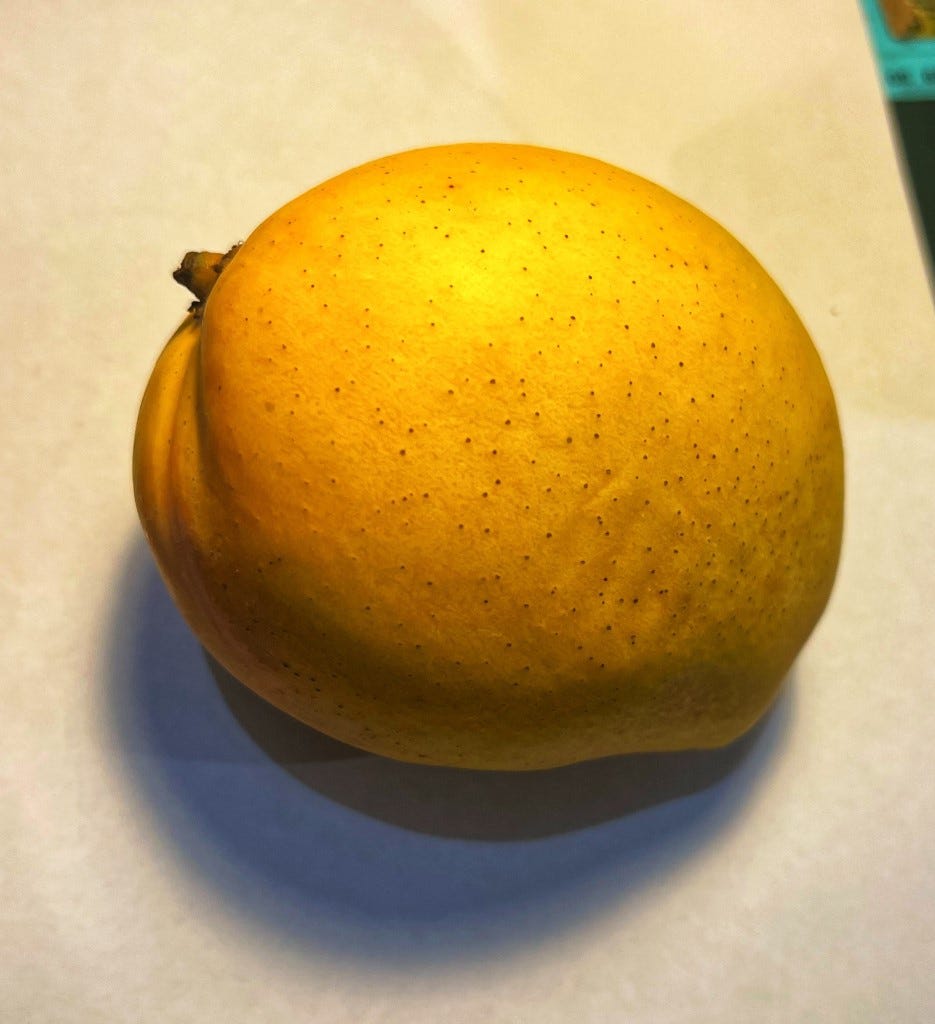
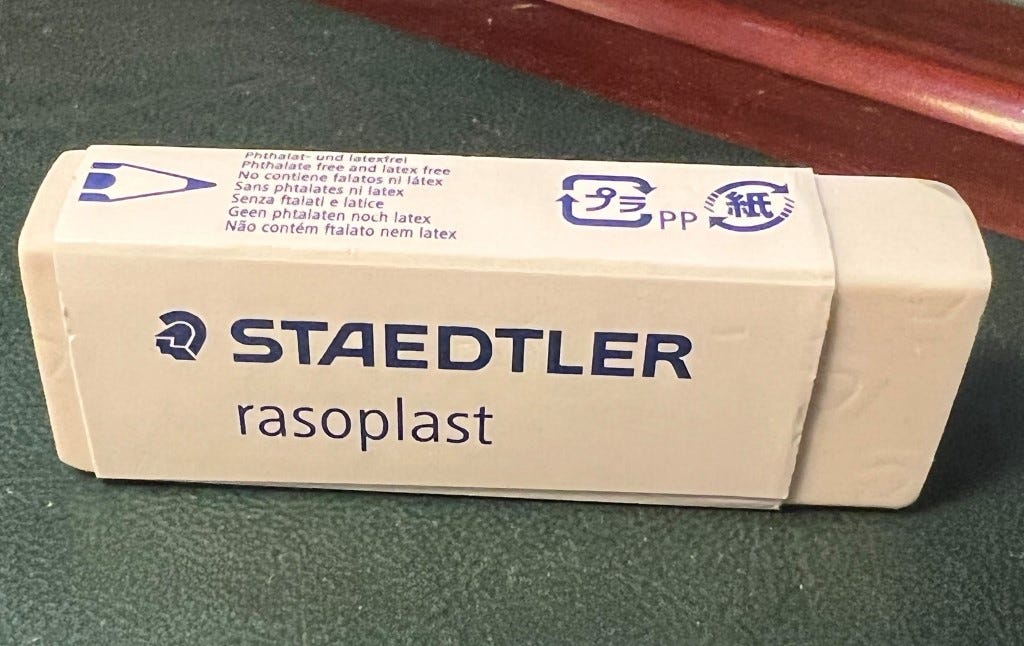
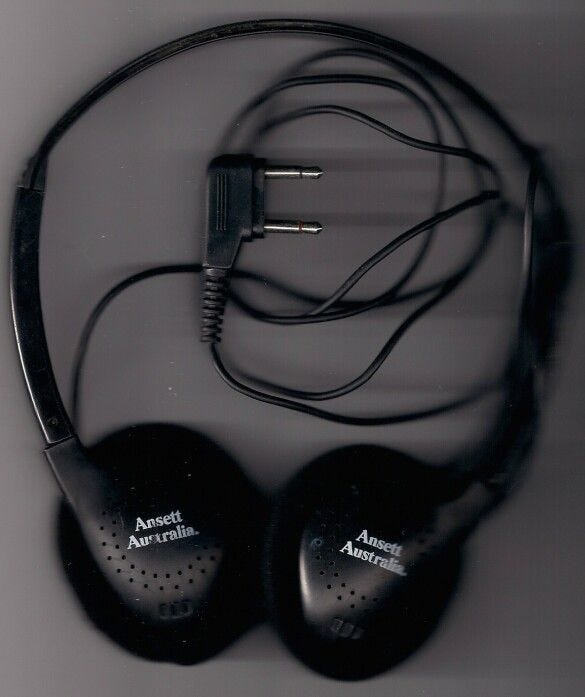
After 10 minutes of wrestling with it, must to my relief, she gave up as we were coming into land in Perth.
Another engaging article Bro Hugh!
I always have a quick Squizzy but end up reading to the end……
Am amazed at the number of memorabilia notes you have retained.
Merry Christmas and Happy NY to both yourself and A.H.from all of the Strongs here in MELB including us.
Gay🧑🎄🤗🔔😍